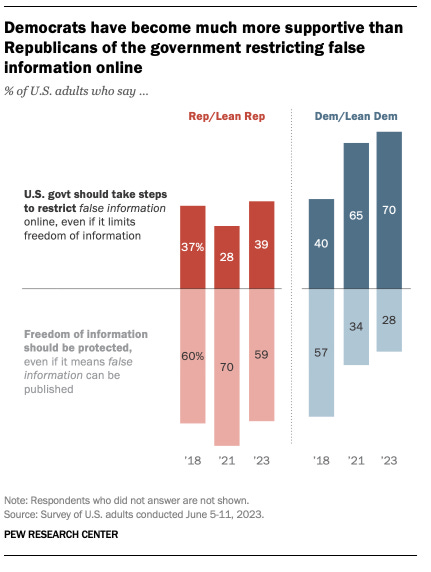For many years, I believed that most people were for free speech. As a result, it wasn’t an issue I worried about or paid much attention to. Of course, I saw various groups raise the alarm about this or that case of censorship. But, for the most part, I felt it wasn’t an issue. The US has a First Amendment, most Western nations have strong free speech protections, and most every nation in the world seemed to be moving in the direction of greater freedom.
Then, in March of this year, I testified before Congress about the Twitter Files and was shocked to see Democratic members argue strenuously that there should be more censorship. I couldn’t believe that representatives of the party of the ACLU were advocating committees of experts and government officials to decide what the rest of us should be allowed to read and write online.
A significant amount of the demand for censorship is coming from the Censorship Industrial Complex and does not represent the will of the people. The FBI, Department of Homeland Security, and CDC have been working hand-in-glove with government-funded NGOs, like the Stanford Internet Observatory, to demand Internet companies censor disfavored views and voices on climate change, Covid, and the war in Ukraine, and other issues. Big Brother Watch in Britain has documented an eerily identical operation there, and we have been documenting similar Censorship Industrial Complexes around the world.
But the fact of the matter is that there is genuine grassroots support for censorship, too. The share of adults in the U.S. who say the federal government should work with tech companies to restrict false information rose from 39% to 55% between 2018 and 2023. Democrats who favor government censorship increased from 40% to 70% between 2018 to 2023. Republicans have been better but are also wavering. Their support for censorship went from 37% to 28% to 39% in 2018, 2021, and 2023, respectively.
Most alarming is the support of young people for censorship. A nationwide survey of 2,250 college students from 131 universities recently found that 74% believe that professors should be reported to the university administration if they say something offensive. Forty percent said a professor should be reported for saying the true statement, "If you look at the data, there is no evidence of anti-Black bias in police shootings."
I wish I could tell you that it’s better in other countries, but it’s not. In most cases, it’s worse, and often much worse. “Americans are the most supportive of free speech and a free press,” notes Pew. “Several European and Latin American nations also emerge as relatively strong supporters, as do Canada, Australia and South Africa.”
Interviews I conducted on the streets of Dublin, Ireland, last month confirmed this. I was shocked and somewhat discouraged to discover widespread support for censorship. At the same time, the people I interviewed didn’t seem that different from the progressives I speak to in the San Francisco Bay Area, where I live. Part of that may be because Dublin is home to Google, Facebook, and other Big Tech companies. But the attitudes in Dublin didn’t strike me as very different from attitudes in other major European cities.
All of this is a massive problem for the future of liberal democratic civilization. America’s founding fathers, contemporary historians, and Constitutional scholars all emphasize that if the public does not support strong free speech protections, the First Amendment and other legal protections mean little. Politicians will become more aggressive in seeking to restrict freedom of speech, and judges and juries will start interpreting the law differently.
As such, we need to become expert at making the case for free speech, as crazy as that may seem to many of us who took it for granted. And so, for the last six months, that’s what my colleagues, my allies, and I have been doing, seeking to not only push back against the Censorship Industrial Complex but also understand what works to change people’s minds. The good news is that, while doing interviews in Ireland, I stumbled upon a weird trick that worked to move people from being knee-jerk pro-censorship to being much more supportive of free speech.






